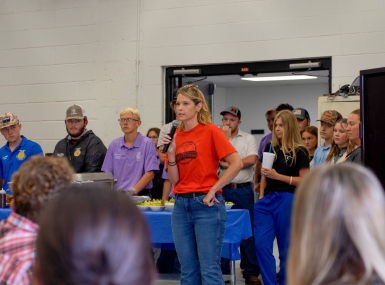Congress enacts changes to paid leave landscape with impacts for counties as employers
Upcoming Events
Related News

Key Takeaways
UPDATE: On April 13, a group of bipartisan U.S. House legislators sent a Dear Colleague letter to congressional leadership urging a legislative fix on new paid leave requirements impacting counties as employers. In the letter, which was sent with NACo’s input and support, lawmakers asked that state and local governments be made eligible for the emergency leave payroll tax credit included under the Families First Coronavirus Response Act (FFCRA) that exempted public employers – including counties – from eligibility. If enacted, the payroll tax credit would help state and local governments cover the costs of expanded paid leave benefits for employees.
Congressional efforts to address the economic impacts of the COVID-19 pandemic have reshaped the paid leave landscape for workers and employers alike, including counties.
As part of the Families First Coronavirus Response Act (FFCRA) (P.L. 116-127), which passed last month as the second “phase” of the federal response to COVID-19, Congress expanded paid family and medical leave benefits through two new laws applicable to businesses with fewer than 500 employees and to government employers of all sizes, including counties. These laws include the Emergency Paid Sick Leave Act (EPSLA) and the Emergency Family Medical Leave Extension Act (EFMLEA), both of which took effect on April 1, 2020 and will remain in effect through December 31 of this year.
According to provisions outlined in the Emergency Paid Sick Leave Act (EPSLA), employers must provide paid sick leave to employees who are unable to work for certain reasons related to COVID-19, including federal or state quarantine orders and to care for a child whose child care provider has closed, among others. The pay rate for employees taking leave under EPSLA rules depends on the reason for leave. The legislation additionally creates guardrails for employees; sick leave is made available to all employees regardless of their length of employment, and employers cannot require workers to use other categories of paid leave (such as PTO) before using paid sick leave.
Meanwhile, the Emergency Family Medical Leave Extension Act (EFMLEA) legislation provides a new leave entitlement under the existing Family Medical Leave Act (FMLA) for employees using leave as a result of a public health emergency. Under EFMLEA rules, employers must provide paid leave to workers who cannot work as a result of COVID-19-related interruptions to their children’s school or child care. Compared to the FMLA, the new EFMLEA shortens the minimum employment period for employees’ leave eligibility from 12 months to 30 days. Both the FMLA and EFMLEA include requirements for certain employers around job restoration, and direct employers to make “reasonable efforts” to contact employees and restore their positions.
To support expansion of these benefits under both the EPSLA and the EFMLEA, the Families First legislation provides certain private employers with fewer than 500 employees with fully refundable tax credits to provide employees with paid sick and family medical leave incurred as a result of COVID-19. The legislation, however, did not extend the tax credit to include state or local governments, thereby placing substantial new paid leave costs on counties as more employees become eligible for leave during the pandemic.
With NACo’s support, congressional legislators are expected to consider a new bipartisan proposal that would extend the emergency leave payroll tax credit to include state and local governments. Sponsored by Reps. Bradley Schneider (D-Ill.) and John Katko (R-N.Y.), the legislation would enable state and local governments employers to address the significant new costs of expanded paid leave requirements, while providing critical safety-net services to 316 million county residents nationwide. The legislation could be introduced in the coming weeks once Congress returns to session in late April or May.
NACo continues to advocate for additional resources for counties to address the full impacts of COVID-19 on our communities, including in any new paid leave legislation and in Congress’ expected “phase four” coronavirus response package.
For additional resources on COVID-19, paid leave and county response efforts, please see the following links:
- Letter to Congressional Leadership: Support State and Local Eligibility for Emergency Leave Payroll Tax Credits (Dear Colleague letter)
- NACo Brief on New Paid Leave and Unemployment Insurance (UI) Requirements for Counties Under COVID-19 Legislation (NACo brief)
- County Priorities in Phase Four COVID-19 Legislation (NACo letter to Capitol Hill)
- COVID-19: County Response Efforts & Priorities (NACo comprehensive resource page)
- COVID-19 and the American Workplace (U.S. Department of Labor temporary rule)
- Families First Coronavirus Response Act: Questions and Answers (U.S. Department of Labor Questions and Answers)
- COVID-19 and the Family and Medical Leave Act Questions and Answers (U.S. Department of Labor question sheet)
- COVID-19 and the Fair Labor Standards Act Questions and Answers (U.S. Department of Labor question sheet)

Related News

Chamber of commerce program helps keep workers on the job
Audrain County, Mo.'s Workforce Resource Assistance Program has helped employers keep staff in place, reducing turnover and promoting stability.

County leadership guides shared prosperity
There’s no chicken-or-egg debate: Economic mobility is not just a byproduct of growth — it is the result of intentional county governance.

Inland port offers opportunity for Hertford County, N.C.
Hertford County, N.C. doesn’t have a lighthouse, but that hasn’t stopped its economic future from shining thanks to what became known as Project Green Lantern.